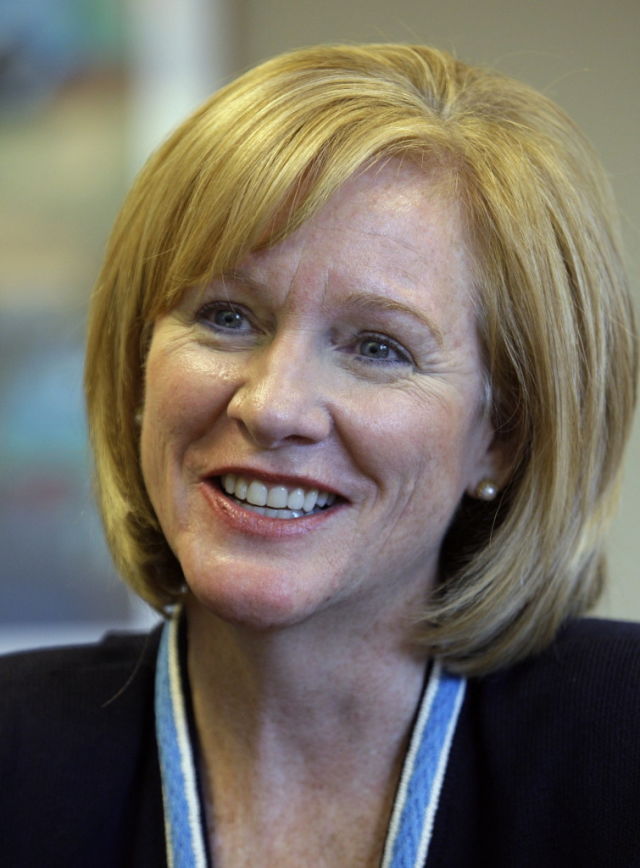Durkan Wants Free College, But Where Would the Money Come From?

Seattle has already made some efforts to improve college access. But mayoral candidate Jenny Durkan is proposing a "holistic" plan for free college tuition—give all graduating Seattle high school students two years of free community college tuition.
Durkan's proposal is an expansion of the 13th Year Promise Scholarship pilot program Mayor Ed Murray championed, allowing all graduates from a handful of high schools one free year of college tuition at South Seattle Community College. That program is funded by private donations, with the first major city investment (up to $5 million) coming from the sweetened beverage tax the city council approved in June.
Durkan's Seattle Promise plan estimates a cost of $4.3 million to $5 million the first year, and that includes $1.5 million a year for counseling and advising high school students to prepare for college. After that it's $7 million a year without inflation, assuming that it would cover one out of four Seattle high school graduates who don't pursue higher education.
"For the relatively small amount of money that we would be investing in the city, the return for our kids is tremendous," she said during a press conference call on the proposal Monday.
Realistically, it could be higher than the estimate knowing that (if it is free college for all students) some high school students who do pursue higher education should be included—assuming some would rather opt for the free community college, once it's available, than one that would leave them with debt.
So where would the money come from? That part's still a little murky. Durkan promises no new revenue and wants to live within the city budget's means. That could include revenue from the soda tax, 2018 families and education levy, or Sound Transit 3's $518 million reserves for education, Durkan said.
It's unclear as to whether that's a realistic plan. And the problem with using those funds—in particular, the soda tax and families and education levy—is that right now, they're earmarked for specific goals meant to address the achievement gap and public health problems in K-12 rather than higher education. When the city council considered using $2.3 million in funds from the families and education levy to switch public schools to a two-tier bus system, council members Tim Burgess and Bruce Harrell both were adamant that the money was specifically designed for the achievement gap, not transportation. The families and education levy advisory board would also determine whether that's the kind of investment that would qualify under its intended purpose. The levy, supported as a property tax by voters back in 2011, is up for renewal soon.
Some have already been critical of the soda tax revenues going toward anything besides more focused public health programs; whether the city approves the use of it toward higher education goals would ultimately be up to the Sweetened Beverage Tax Community Advisory Board. And the funding it does have for education, much like the families and education levy, is meant for pre-K through 12th grade—with the exception of up to $5 million total for the 13th Year Promise Scholarship program over the course of five years.
"We know that there’s other issues we have to attack and we will attack," Durkan said Monday. "We know that we’ve got to help close the achievement and opportunity gap so that every kid can make it to graduation, and we will work with Seattle Public Schools, parents, and community to tackle that problem."
Currently only $3 million is left unallocated from the families and education levy, which right now only focuses on early learning and K-12 education, as well as "advising, guidance, and related support for college readiness," according to city's Department of Education and Early Learning. It can't be used to fund college tuition. The levy is up for renewal next year, and Durkan does specify in her plan the "2018 families and education levy"—that would technically be additional revenue, since the tax was due to expire. Though city officials were hoping the new mayor would renew the levy anyway, they also have in mind using the funds for pre-college education.
As for Sound Transit 3, the $518 million pool for education is for King, Pierce, and Snohomish counties, and it would be up to the state Legislature to allocate the funds. The money can be used "to improve educational outcomes in early learning, K-12 and higher education within the Sound Transit District," and would have to follow Sound Transit's subarea equity policy.
Mayoral candidate Cary Moon issued a statement Monday that said Durkan's proposal wasn't enough and did call for "new revenue for higher education" using a statewide tax on capital gains—politically that's a challenge, and not something that would likely happen anytime soon in the Legislature. She said there should be investment "from cradle to college" and "address inequity in Seattle education as its root causes."
Updated Tuesday, August 29, at 10:35am with more information on the families and education levy after a response from the city's Department of Education and Early Learning.




